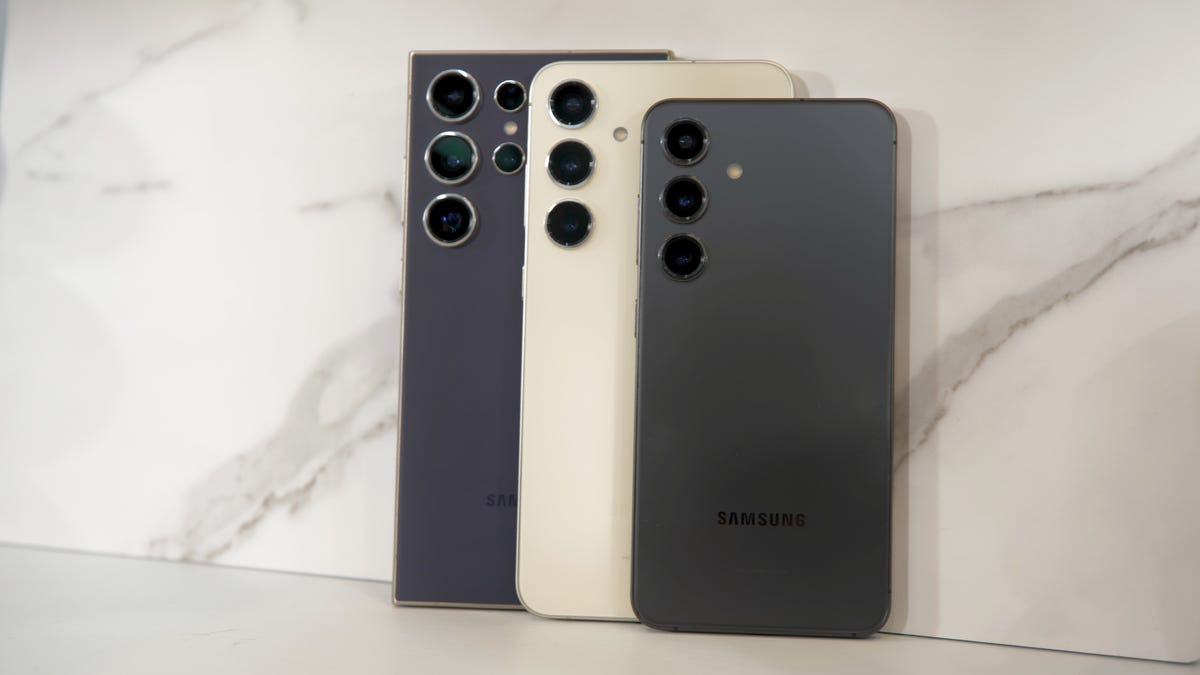Galaxy S24: Samsung's First Flagship Phones With Recycled Cobalt Are Here
Samsung aims to incorporate recycled materials into all Galaxy products by next year.

From left-to-right: The Galaxy S24 Ultra, S24 Plus and S24.
Samsung's Galaxy S24 phone lineup uses components made with recycled cobalt and rare earth elements, in a first for Galaxy flagships.
The South Korean company says it sourced the recycled cobalt from lithium-ion batteries that were discarded by its partners during the battery manufacturing process. The rare earth elements were recovered from magnets discarded during manufacturing or from other products at the end of life, the company said.
Read more: A Fully Recycled Phone Is a Lot Harder Than it Sounds, Even for Apple and Samsung
This advances Samsung's efforts towards its goal of incorporating recycled materials into all Galaxy products by 2025. The company aims to use recycled materials in every component of its mobile products by 2030. The higher-end Galaxy S24 Plus and Galaxy S24 Ultra will have 50% recycled cobalt, the company said.
"The demand for and supply of cobalt continue to grow, but the artisanal mining associated with these minerals has raised environmental and ethical concerns around the world," Daniel Araujo, vice president of Samsung's mobile business, said at a press briefing ahead of the company's annual Unpacked promotional event. "Therefore, it's paramount that we expand our use of recycled cobalt and rare earth elements across our product lineup."
Apart from adding recycled cobalt and rare earth elements to the Galaxy S24 lineup, Samsung also said the series' packaging now uses 100% recycled paper material, bringing Samsung closer to eliminating single-use plastics. It also pledged to offer seven generations of OS updates and security updates, which is up significantly from the four years Samsung offered for the Galaxy S23 series in 2023. This could lead S24 owners to wait longer to upgrade their phones. However, Samsung is still behind Google and Fairphone in the Pixel 8 series and Fairphone 5, respectively, which each offer an eight-year software update policy.
Samsung's green track record
Despite Samsung's recent environmental push over the last several years, the company's green record and credentials lag behind some of its peers, according to Greenpeace.
Although Samsung announced that it'll invest billions of dollars to achieve carbon neutrality and transition entirely to renewable energy use by 2050, it stopped short of extending its carbon neutrality commitment to its supply chain. By comparison, Apple has committed to decarbonizing its supply chain as well as its products by 2030. Google is aiming for net-zero emissions across its operations and value chain by 2030, and says it's bought enough "high-quality" carbon offsets to eliminate its carbon legacy.
Read more: Samsung Ranks Last Among Top Chipmakers for Decarbonisation Efforts, Report Finds
Samsung estimates that last year's Galaxy S23 Plus produces 58.8 kg of carbon dioxide equivalents across its lifetime, of which 83% takes place during production. This underscores that the manufacturing process is the most carbon-intensive phase of the Galaxy 23's lifecycle (and presumably the Galaxy 24's too). The carbon dioxide emitted in the remaining phases -- transport to storefronts, daily use by owners and end of life -- is much less, but the environmental impact is still significant.
Smartphone industry's carbon footprint
Samsung makes a number of different Galaxy phone models.
In recent years, carbon emissions generated from the consumer technology supply chain, or companies like Samsung and Apple, have ballooned, alongside the rapid growth of the consumer electronics market. A Deloitte report published in 2021, estimated that the smartphone industry generated 146 million tons of CO2 or equivalent emissions in 2022.
Greenpeace says a majority of carbon emissions in the electronics industry originate from electricity sourcing for manufacturing of components and devices. To achieve carbon neutrality, it's crucial for suppliers in big tech's extensive supply chain to adopt clean energy practices while creating and shipping parts, according to the nonprofit.
"Consumer electronics suppliers, including semiconductor manufacturers, display manufacturers and final assemblers, account for more than three quarters of the electronics industry's total emissions," according to Greenpeace. "And electricity consumption is where most emissions come from during the manufacturing process."

